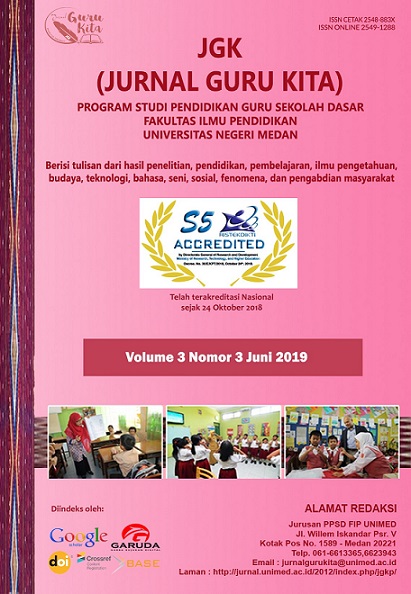PENINGKATAN HASIL BELAJAR MATERI DESCRIPTIVE TEXT MELALUI METODE MIND MAPPING BAGI SISWA KELAS VII-I SMPN 1 SIDIKALANG
DOI:
https://doi.org/10.24114/jgk.v3i3.14604Abstract
Abstract: Improvement of Learning Outcomes of Descriptive Text Material Through Mind Mapping Methods for Class VII-I Students of SMPN 1 Sidikalang.The objectivity of the reseach is for increase the result of the English Lesson of descriptive text through the mind-mapping method for the first grade students in class VII-I SMPN 1 Sidikalang in second semester academis year 2018/2019. This research was used action research classroom in two cycles. Every cycle concist of 4 grade, mainly : planning, acting, observing/evaluating and reflecting. According to the result of research, we can make conclusion that using mind-mapping method can increase the result of learning English in the seven I grade of Junior Hidgh School 1 Sidikalang. With the total of 32 students, the result on the first cycle show that there are 19 students (59,38%) get KKM 75 or more. On the second cycle show 27 students (84,37%) get KKM 75 or more in formatif test and the students show good response in the whole indicators. Based on the hypothesis of the research conclude that mind-mapping method can increase the result of learning English about descriptive text for the students in class VII-I SMPN 1 Sidikalang in academic year 2018/2019.Keywords: English, descriptive text, mind mapping, learning resultAbstrak: Peningkatan Hasil Belajar Materi Descriptive Text Melalui Metode Mind Mapping Bagi Siswa Kelas VII-I SMPN 1 Sidikalang.Penelitian ini bertujuan untuk meningkatkan prestasi belajar Bahasa Inggris materi descriptive text melalui penerapan metode mind mapping pada siswa kelas VII-I SMPN 1 Sidikalang tahun pelajaran 2018/2019. Metode penelitian yang digunakan adalah penelitian tindakan kelas yang dilakukan dalam dua siklus. Tiap-tiap siklus terdiri dari 4 tahap yaitu: perencanaan, pelaksanaan, pengamatan/ evaluasi, dan refleksi. Berdasarkan pembahasan hasil penelitian dapat diambil kesimpulan bahwa penggunaan metode mind mapping mampu meningkatkan prestasi belajar Bahasa Inggris siswa kelas VII-I SMPN 1 Sidikalang.Dari total 32 siswa, hasil silkus I menunjukkan hanya 19 siswa (59,38%) memperoleh nilai sama atau lebih dari nilai KKM. Hasil siklus II penelitian menunjukkan 27 siswa (84,37%) memperoleh nilai KKM sebesar 75 atau lebih dalam tes formatif dan siswa menunjukkan respon yang baik pada seluruh indikator pengamatan pembelajaran. Berdasarkan hasil tersebut maka hipotesis penelitian ini yang menyatakan penggunaan metode mind mapping dapat meningkatkan prestasi belajar Bahasa Inggris materi descriptive text pada siswa kelas VII-I SMPN 1 Sidikalang tahun pelajaran 2018/2019.Kata Kunci: Bahasa Inggris, descriptive text , mind mappping, prestasi belajarDownloads
Published
2019-09-17
How to Cite
Saragih, R. S. (2019). PENINGKATAN HASIL BELAJAR MATERI DESCRIPTIVE TEXT MELALUI METODE MIND MAPPING BAGI SISWA KELAS VII-I SMPN 1 SIDIKALANG. JGK (Jurnal Guru Kita), 3(3), 290–299. https://doi.org/10.24114/jgk.v3i3.14604
Issue
Section
Articles
License
Authors published with the JGK (Jurnal Guru Kita) agree to the following terms:
- Authors retain copyright and grant the journal the right of first publication with the work simultaneously licensed under a Creative Commons Attribution License (CC BY-SA 4.0) that allows others to share the work with an acknowledgment of the work's authorship and initial publication in this journal.
- Authors are able to enter into separate, additional contractual arrangements for the non-exclusive distribution of the journal's published version of the work (e.g., post it to an institutional repository or publish it in a book), with an acknowledgment of its initial publication in this journal.
- Authors are permitted and encouraged to post their work online (e.g., in institutional repositories or on their website) prior to and during the submission process, as it can lead to productive exchanges, as well as earlier and greater citation of published work. (See The Effect of Open Access)


























